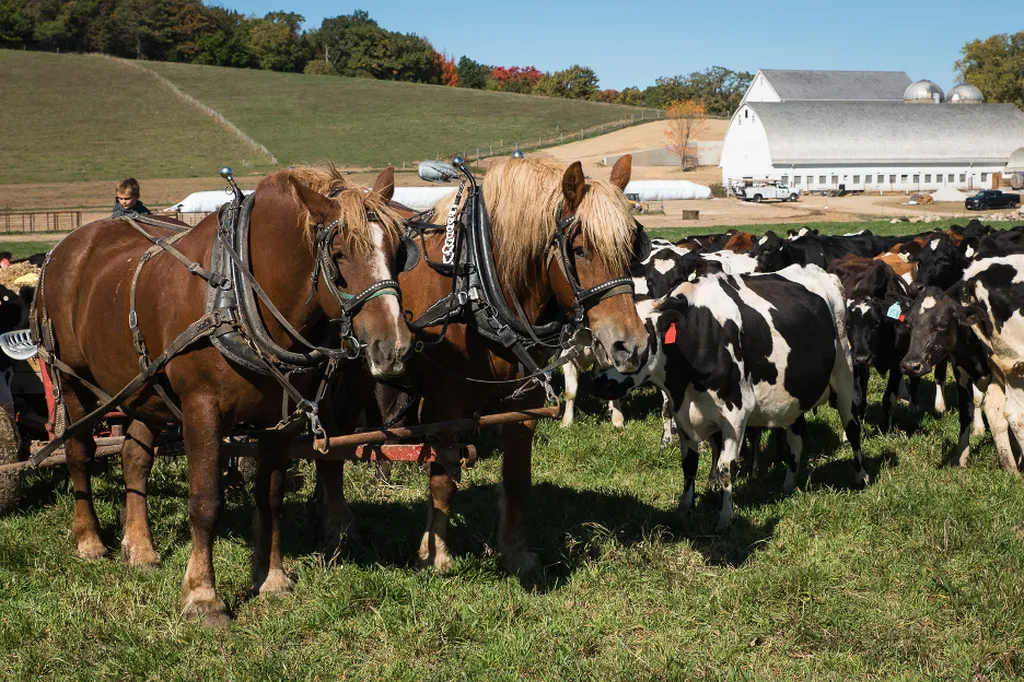At Sanborn Mills Farm in Loudon, New Hampshire, the steady clip-clop of hooves isn’t just a nostalgic echo of the past—it’s the rhythm of daily operations. Ray Ramsey, the farm’s manager, relies on draft animals for nearly 90% of the work, a deliberate choice in an era where modern machinery dominates agriculture. This weekend, the farm will host the Draft Animal Power Network’s annual Field Days, a three-day gathering where farmers, both novice and experienced, will share knowledge on integrating horses, oxen, and mules into contemporary farming and forestry.
The event reflects a quiet but persistent movement: a return to draft animal power not out of rejection of progress, but as a practical, sustainable alternative. For Ramsey, who grew up on a large-scale Midwest farm where draft animals weren’t feasible, the shift is both philosophical and economic. “People think, ‘We’re not in the 1800s anymore,’ but there are effective ways of using draft animal power,” he explains. Without tractor payments, soil compaction concerns, or reliance on fossil fuels, draft animals offer a lower-cost, lower-impact method of farming—one where their manure fertilizes the same fields they till.
The Field Days will begin with intensive workshops on Friday, covering fundamentals like harnessing, emergency animal rescue, and even building an ox cart in a single day. (Those carts will later be auctioned to benefit the network.) Over the weekend, shorter sessions will dive into skills like hoof trimming, plowing, and chainsaw maintenance—practical knowledge that bridges historical techniques with modern needs. Planning an event of this scale takes nearly a year, Ramsey notes, but the effort is worth it. As the network’s local coordinator, he’s the “boots on the ground,” ensuring the logistics run smoothly for the dozens of attendees and nearly a dozen draft animals arriving from across the region.
Maggie Smith, a farmer near Ithaca, New York, and a volunteer with the Draft Animal Power Network, embodies this blend of old and new. She uses her two draft horses for nearly every stage of cultivation, from planting to harvest, supplementing only with a gas-powered thresher. “A bunch of the equipment’s heyday was 100 years ago,” she admits. To keep it running, she turns to networks of like-minded farmers, historical records, and even Amish communities, who’ve preserved many of these traditions. For Smith, draft animals aren’t just tools—they’re partners in a more sustainable system. “Modern logging is destructive,” she points out, “but horses and oxen allow for selective, low-impact forestry.” On the farm, they help close the nutrient loop, turning waste into fertilizer. And then there’s the less tangible benefit: “It’s good for our souls,” she says. “Animal people get that.”
Central to the event—and the ethos of draft animal farming—is the welfare of the animals themselves. Ramsey emphasizes a simple but critical principle: “It’s better to go light and go often than to go heavy and go once.” Overworking an animal not only exhausts it but risks long-term trust. “If you’re continuously heavy, they’re smart enough to know what’s going on, and they won’t want to work for you anymore,” he says. This respect for the animals’ limits underscores every workshop, from harnessing to emergency care.
The Field Days serve as both a practical training ground and a testament to an enduring tradition. For farmers like Ramsey and Smith, draft animals aren’t a relic but a living, evolving practice—one that offers solutions to modern challenges like soil health, equipment costs, and environmental impact. As Ramsey puts it, “Every time we lose one of our forefathers, we lose a piece of our history.” Events like this ensure that knowledge isn’t just preserved, but adapted for the future.
The gathering runs from October 3–5 at Sanborn Mills Farm, with online registration encouraged but not required. For farmers curious about draft power—or simply seeking a more connected way to work the land—the event offers a rare chance to learn from those who’ve made tradition their innovation.

